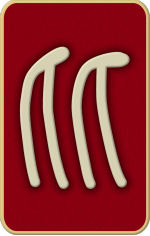
比 Bǐ Belonging (Union) [hexagram 8]


Water over Earth
 Water element
Water element
Lunar month: 4 ; Host (controlling) line : 2
The Decision
Belonging (when appropriate) is fortunate. Reflect on whether virtue is unfaltering and resolute. If so, there is no problem. Those who hold back will be less fortunate.
‘Belonging is fortunate’ – it denotes seeking help from wiser people. ‘Reflect on whether virtue is unfaltering and resolute’ – there is strength in the middle. ‘Those who hold back will be less fortunate’ – they have lost their way.
比: 吉. 原筮元永贞, 无咎. 不宁方来, 后夫凶. Bǐ: jí. yuán shì yuán yǒng zhēn, wú jiù. bù níng fāng lái, hòu fū xiōng.
彖传: 比, 吉也, 比, 辅也, 下顺从也. 原筮元永贞, 无咎, 以刚中也. 不宁方来, 上下应也. 后夫凶, 其道穷也. Tuàn zhuàn: bǐ, jí yě, bǐ, fǔ yě, xià shùn cóng yě. yuán shì yuán yǒng zhēn, wú jiù, yǐ gāng zhōng yě. bù níng fāng lái, shàng xià yìng yě. hòu fū xiōng, qí dào qióng yě.
The Image
Earth over water denotes ‘belonging’. Wise leaders maintain fond relations with their people.
象传: 地上有水, 比; 先王以建万国, 亲诸侯. Xiàng zhuàn: Dì shang yǒu shuǐ, bǐ; xiān wáng yǐ jiàn wàn guó, qīn zhū hóu.
Line Change 1
Sincerely seeking affection. This is blameless. Being sincere like a laden bowl will eventually bring success.
‘Sincerely seeking affection’ – will bring unexpected advantages.
初六: 有孚, 比之, 无咎. 有孚盈缶, 终来有它吉. Chū liù: yǒu fú, bǐ zhī, wú jiù. yǒu fú yíng fǒu, zhōng lái yǒu tā jí.
象传: 比之初六, 有他吉也. Xiàng zhuàn: Bǐ zhī chū liù, yǒu tā jí yě.
Line Change 2
Progress towards union comes from the heart. Perseverance will win out in the end.
‘Progress towards union comes from the heart’ – decent feelings will not fail.
六二: 比之自内, 贞吉. Liù èr: bǐ zhī zì nèi, zhēn jí.
象传: 比之自内, 不自失也. Xiàng zhuàn: Bǐ zhī zì nèi, bù zì shī yě.
Line Change 3
Getting together with the wrong people.
‘Getting together with the wrong people’ – will not this lead to harm?
六三: 比之匪人. Liù sān: bǐ zhī fěi rén.
象传: 比之匪人, 不亦伤乎! Xiàng zhuàn: Bǐ zhī fěi rén, bù yì shāng hū!
Line Change 4
Getting together with someone. Perseverance will bring success.
‘Getting together with someone’ – following good leadership.
六四: 外比之, 贞吉. Liù sì: wài bǐ zhī, zhēn jí.
象传: 外比于贤, 以从上也. Xiàng zhuàn: Wài bǐ yú xián, yǐ cóng shǎng yě.
Line Change 5
Great expectation from getting together. The hunt confines the game on three sides; the quarry runs out in front. No-one opposes. All ends well.
‘Great expectation from getting together’ – the position is central and correct. Ignoring those that confront and taking the willing target. ‘The quarry runs out in front. No-one opposes’ – the higher commands the middle.
九五: 显比, 王用三驱, 失前禽. 邑人不诫, 吉. Jiǔ wǔ: xiǎn bǐ, wáng yòng sān qū, shī qián qín. yì rén bù jiè, jí.
象传: 显比之吉, 位正中也. 舍逆取顺, 失前禽也. 邑人不诫, 上使中也. Xiàng zhuàn: Xiǎn bǐ zhī jí, wèi zhèng zhōng yě. shè nì qǔ shùn, shī qián qín yě. yì rén bù jiè, shǎng shǐ zhōng yě.
Line Change 6
Seeking union without proper preparation ends in misfortune.
‘Seeking union without proper preparation’ – nothing worthwhile can be accomplished.
上六: 比之无首, 凶. Shǎng liù: bǐ zhī wú shǒu, xiōng.
象传: 比之无首, 无所终也. Xiàng zhuàn: Bǐ zhī wú shǒu, wú suǒ zhōng yě.
The full set of 64 English translations is available in our new book 'Book of Changes - Deciphered' ➚.